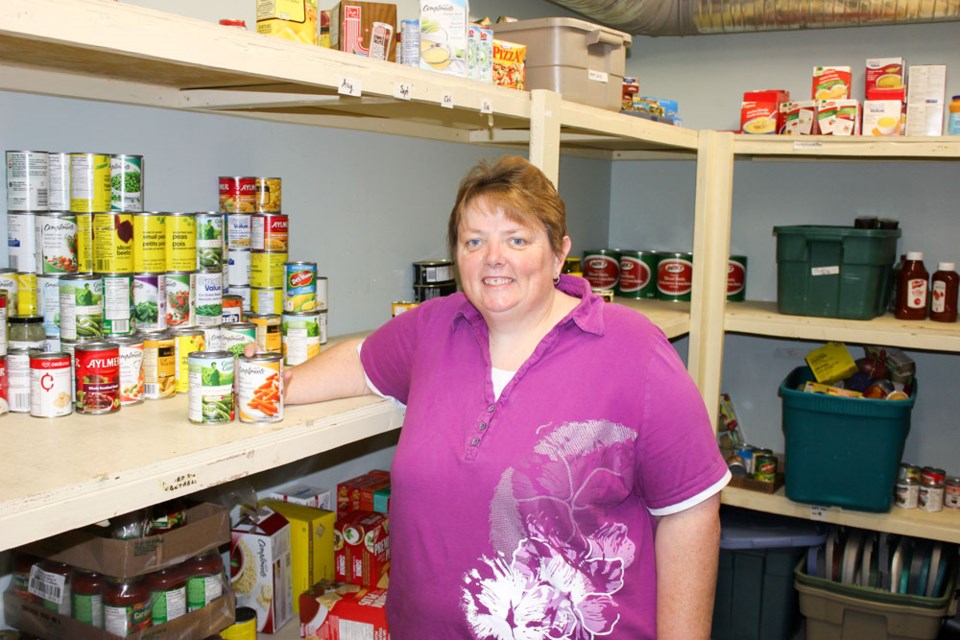The Salvation Army food bank has been seeing a lot of food changing hands over the last few months. March has been no exception, with business significantly higher than in previous years and a shrinking supply of food on the shelves.
"It's been super-duper busy," said Ronza Reynard, administrative assistant and family services co-ordinator with the Estevan chapter of the Salvation Army, describing the activity at the food bank. "It was higher than it was last year, and I don't see it going down anytime soon."
Reynard said the amount of people seeking assistance from the food bank this month is between 60 to 65 per cent higher than in previous years, and that "we anticipated that, with the economy being the way it's been in Estevan this last while."
She said the food bank helps about four or five different families a week, on average, and helped out a total of around 110 people in February.
Reynard said the Salvation Army has been seeing a mix of people, consisting of both regulars and new families who have never used the food bank's services before. She noted there have been a lot of smaller families seeking assistance this year.
Reynard said the people using the services the food bank for help don't all fit one specific category, and noted, "you'd be surprised by the people who regularly use the food bank."
People who have turned to the food bank this year come from a number of backgrounds and are in a number of different situations, as far as their finances are concerned.
"We see so many people, for instance, who are employed, but have had their hours cut back quite a bit, with their jobs. When you're used to working a 40-hour week, and now you're working a 28-hour week, that makes a big difference on your paycheque, from week to week," said Reynard. "We're seeing that and we're seeing a lot of people who have been on unemployment and are unable to secure jobs, waiting on social services."
The food bank serves Estevan and a constellation of other towns in the area from Midale, to Torquay to Oxbow to North Portal, and is always encouraging donations. The need for donations is particularly strong, as is the case for a month as busy as March is proving to be.
Reynard said that donations the food bank needs most at this time include: condiments like ketchup and mustard, pancake mix, canned fruit, spreads such as peanut butter and jam, canned fruit tomatoes, instant noodles, pudding cups, canned pastas and dried side dishes.
"We like to get things for kids in their lunches at school, too,” said Reynard. “Canned meat, canned veggies and a little of everything."
Reynard said that with the low value of the Canadian dollar and its influence on the costs of produce, there is an effect in the amount people are able to donate to the food bank. She noted the food bank tends to not have a lot produce and fresh food donated to it, because of its short shelf life.
"It's easier for us to go and purchase things like produce, when we know how many appointments we have, because we can gauge the need for it, whereas a can of beans can sit around for a long time and we don't have to worry about it," said Reynard. "People who go to the grocery store and say, 'I'm going to buy a few items for the food bank' are now unable to do that because they're probably thinking with the cost of food that they can only get what they need for their own family. And that's completely understandable with the higher prices at the grocery store."
Reynard acknowledged the help of local groups and businesses in the community, saying that the RBC is conducting a food drive, giving out gift cards for food donations.
"That's going to help us out, and they're running that until April. Right now, we do have a list of things and if people want to give us a call, we can tell them what's on our list," said Reynard. "We'll see what happens and probably pursue another food drive for the end of April or early May."
Reynard said the Salvation Army is already preparing for initiatives and drives in the summer, saying, "we had a good Christmas and got a lot of stuff then, and that's what's carrying us through right now."
She noted it’s important to always be planning, because the food bank's shelves are about 35 per cent full on average, with the supply of food slowly diminishing over time.
Reynard encouraged anyone interested in getting involved or sharing ideas to contact the Salvation Army.




